
Welcome back to our newsletter series exploring the transformative power of generative artificial intelligence (GenAI). Our inaugural article introduced the fundamentals of AI and why it represents a pivotal technology for organizations today. Now, we delve into the key areas where businesses are leveraging AI's capabilities enhanced by advancements in GenAI, accelerating implementation.
The U.S. Census Bureau forecasts a remarkable surge in AI adoption among American companies, projecting a near-doubling from 3.7% in Fall 2023 to 6.6% by Fall 2024, with younger and larger enterprises leading the charge. This edition takes a thematic approach to highlighting the most prevalent GenAI solutions, applicable across diverse business landscapes.
It's crucial to understand that GenAI encompasses a broad spectrum of modalities, including text, images, numerical data, code, audio, video, and simulated data. The optimal solution depends on the specific use case. For instance, finance applications tend to leverage text, data, and code-based GenAI, while marketing initiatives may rely more heavily on video, audio, and imagery. Regardless of the industry or function, GenAI's versatility offers boundless opportunities for innovation and operational excellence.
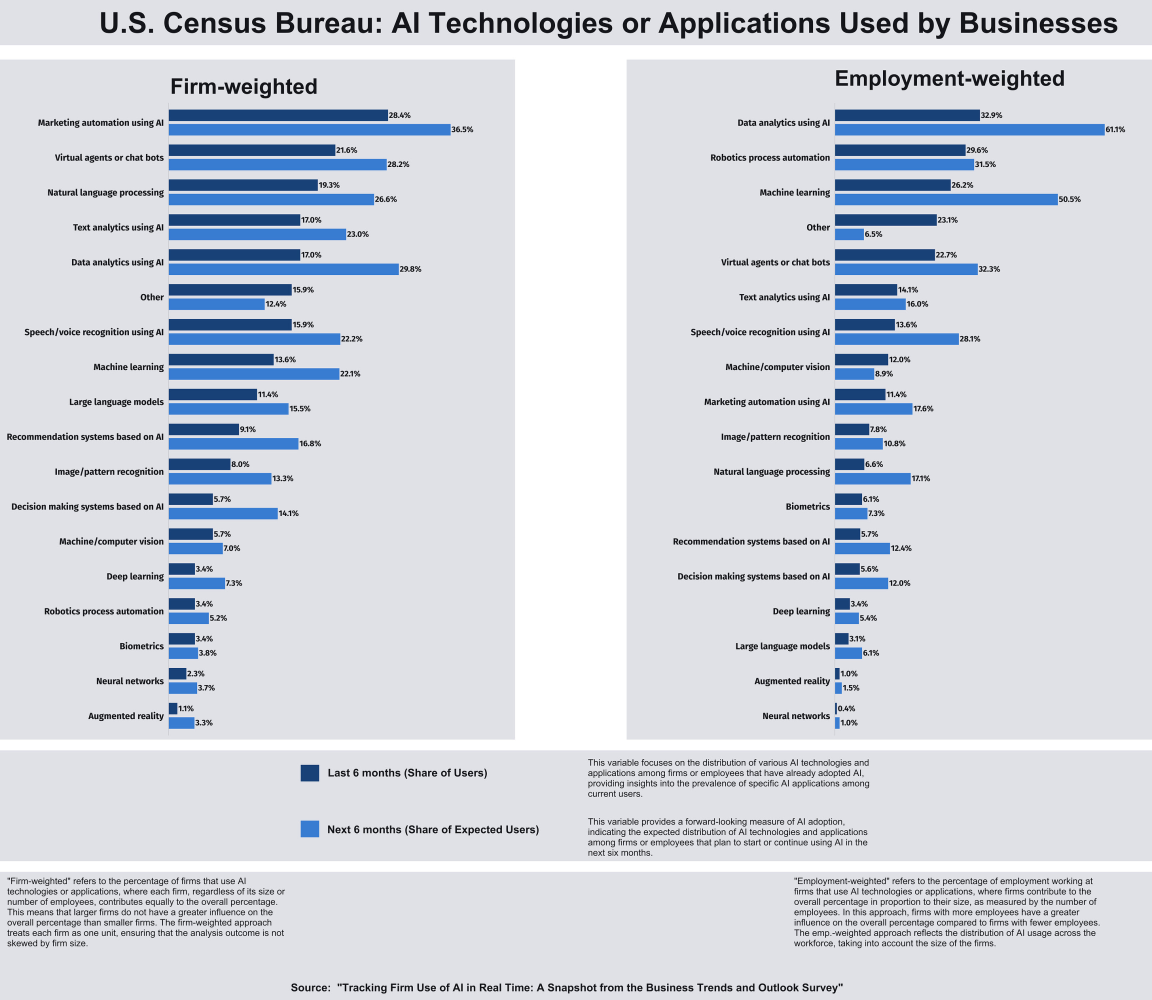
1. AI-Powered Chatbots, Virtual Assistants and Copilots
The advent of GenAI has revolutionized the development of intelligent virtual assistants and chatbots, making them more accurate, cost-effective, and tailored to organizational needs. These AI-driven solutions are being leveraged for both external and internal operations, streamlining processes and elevating user experiences. Internally, virtual assistants powered by GenAI are assisting employees across various functions, from onboarding and navigating internal knowledge repositories (e.g., accounting policies, employee benefits) to offboarding processes. Platforms like Zoom have introduced AI Companions that aid in composing chat responses, summarizing meeting discussions, and ensuring seamless collaboration, with additional feature enhancements in the pipeline. By harnessing the capabilities of GenAI, organizations can create intelligent assistants tailored to their specific needs, streamlining operations, enhancing user experiences, and unlocking new efficiencies across the enterprise.
Zoom's AI Companion in action
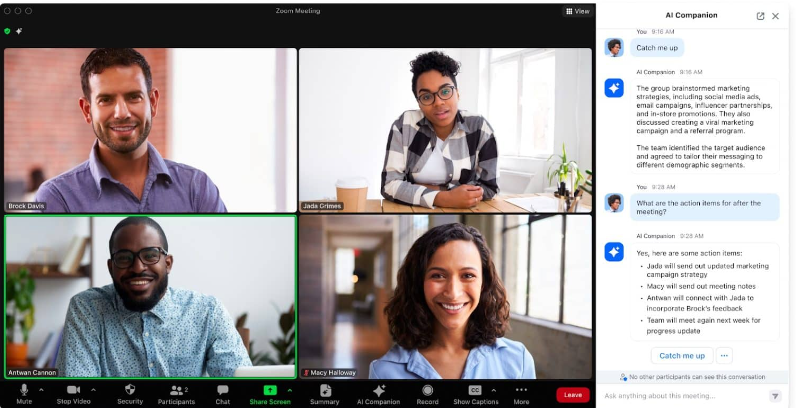
Beyond information provision, AI copilot tools like Microsoft's Copilot are designed to create new content based on simple user prompts. These copilots seamlessly integrate across various platforms, enabling users to leverage the full range of organizational tools and data. For example, a user can request the Microsoft Copilot to "prepare a PowerPoint presentation summarizing key points from a meeting," and the AI will sift through calendar appointments, meeting minutes, and audio recordings to generate a comprehensive slide deck. By harnessing AI's capabilities, organizations can unlock new levels of efficiency, collaboration, and productivity, elevating their operations and delivering superior experiences across internal and external touchpoints.
2. AI Revolutionizing Content Creation and Analysis
AI is revolutionizing the way content is generated and optimized, transforming traditional workflows across industries. AI writing tools can now generate original articles, stories, scripts, and marketing content from simple prompts or outlines. Conversely, visual AI models can produce graphics and images based on textual descriptions, enabling a seamless blend of visual and written content. In the finance sector, AI is drafting narratives for annual and quarterly reports, workpapers, audit documentation, and technical accounting memos, streamlining processes and reducing manual effort. The music industry is also embracing AI's capabilities, with tools that can compose original music tracks and songs based on specified styles or parameters.
Beyond content creation, AI plays a pivotal role in content analysis. Natural language processing (NLP) empowers machines to understand context, sentiment, and extract insights from vast volumes of textual data. This includes automated summarization, content moderation to filter offensive material, and powering recommendation engines for streaming and e-commerce platforms. Moreover, AI-driven analytics provide deep insights into audience interests and engagement patterns, guiding strategic content planning and ensuring optimal content resonance.
As AI capabilities continue to evolve, the content creation and analysis landscape is poised for further transformation, unlocking new levels of efficiency, creativity, and data-driven decision-making across industries.
AI-augmented social media marketing spend to hit $105B this year
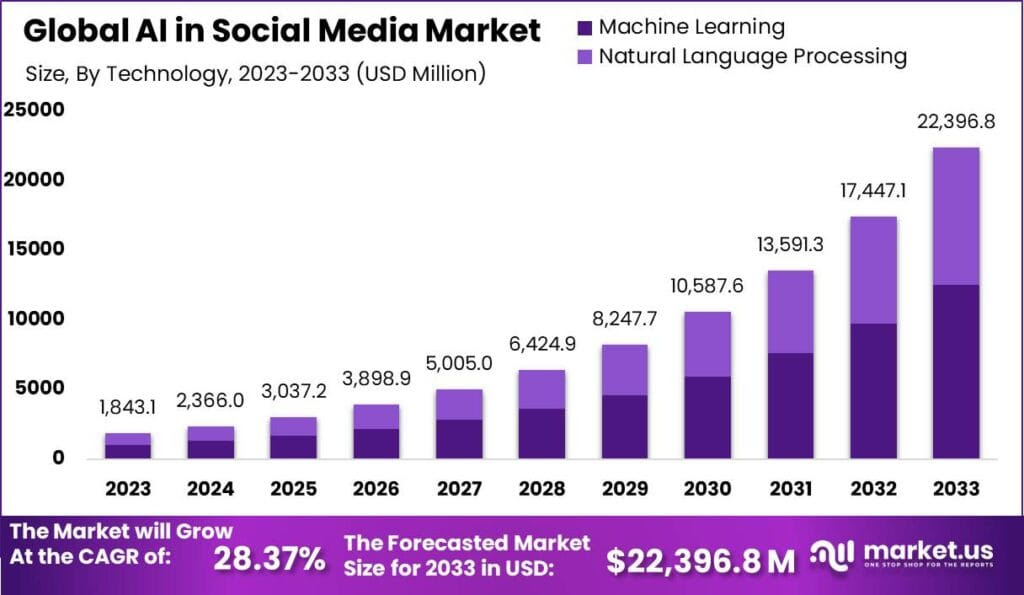
3. AI: Democratizing Knowledge Access and Insights
AI is revolutionizing knowledge management across organizations, democratizing access to institutional documents, data, and subject matter expertise. AI simplifies the dissemination of knowledge, empowering employees with ready access to information that previously required specialized support or IT intervention. No longer are data queries limited to IT professionals alone. AI-powered solutions can now create and execute scripts to retrieve data from various systems based on simple natural language prompts, eliminating technical barriers and streamlining information access.
Furthermore, AI excels at analyzing vast volumes of textual data, generating concise summaries and extracting key insights with unparalleled efficiency. This capability extends to creating and storing transcripts from meetings, ensuring valuable information is captured and readily accessible for future reference.
Gartner - AI will run 80% of project management by 2030
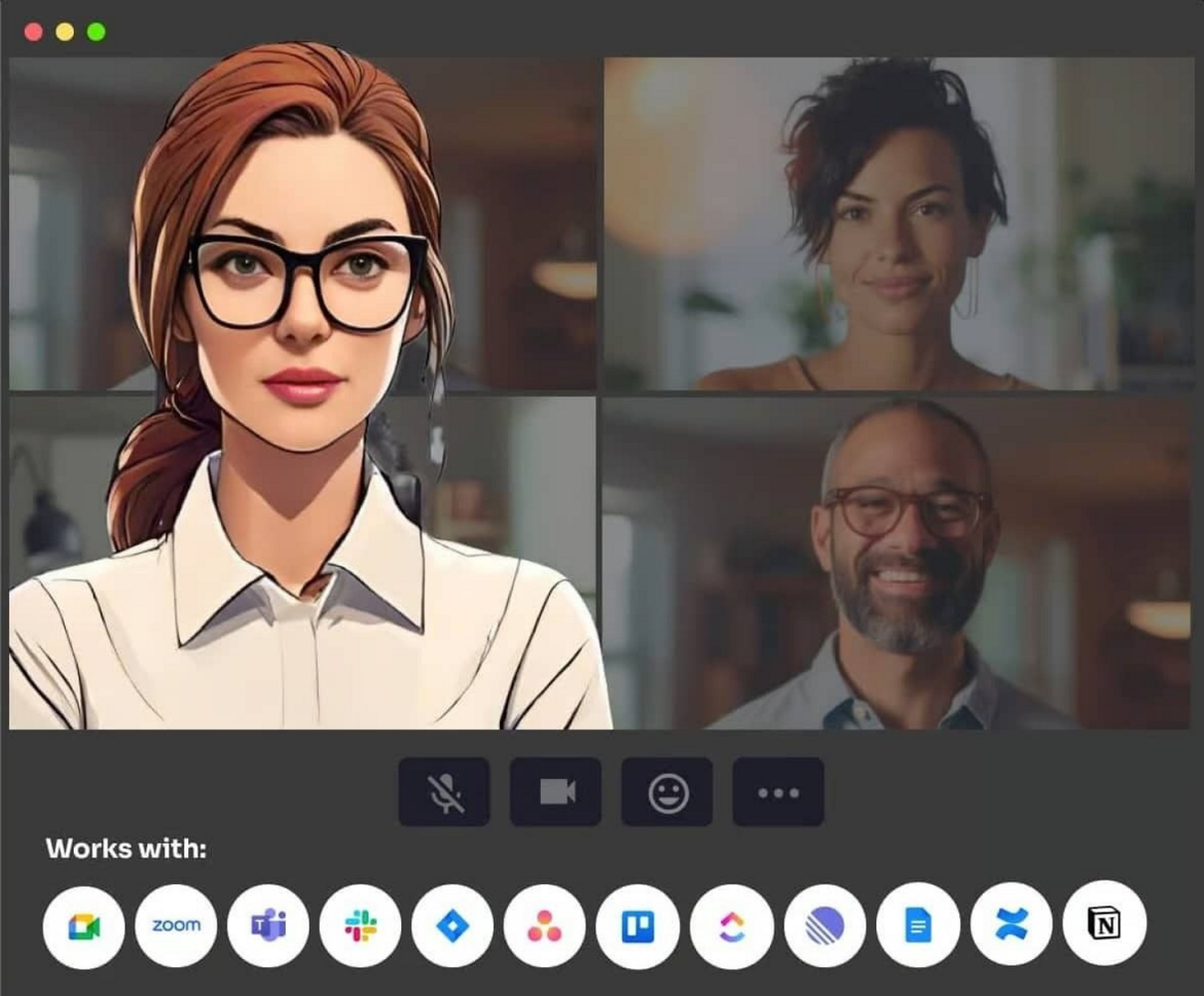
4. AI Driving Operational Excellence and Process Automation/Optimization
AI is transforming operations and process automation across industries, delivering unparalleled efficiency gains and cost optimization. AI supports business functions such as finance, supply chain, and sales optimization by analyzing data from various sources, including real-time logistics, procure-to-pay and order-to-cash processes, inventory levels, and demand forecasts. This data-driven approach empowers businesses to identify bottlenecks, reduce costs, and streamline overall operational efficiency.
Moreover, intelligent automation systems, powered by AI, enable businesses to handle complex tasks, learn from data, and adapt to changing conditions seamlessly. Accounts Payable and Receivable processes can be partially or fully automated, leveraging AI to minimize human errors, drastically reduce costs, and implement robust controls. Audit and ESG checklist completions, dashboard creations, workflow management, and report generation can all be automated by AI engines, driving significant time and resource savings.
Investment in AI-driven automation often yields a positive return within the first year, underscoring the substantial benefits and competitive advantages AI offers.
5. AI Accelerating Systems and Technology Development
Generative AI's ability to produce scripts across programming languages like SQL, Python, JavaScript, and C++ has dramatically accelerated software development. AI can create new code from scratch, review existing code for errors, and apply enhancements to improve efficiency. It can generate code annotations and even code that incorporates multiple programming languages, enabling seamless integration across systems; it can write code to query, massage or create data.
AI assistants such as Microsoft's GitHub Copilot and Cognition Labs' Devin (touted to be the world's first fully autonomous AI software engineer) do not render engineers obsolete, they do significantly improve speed and quality. Stripe engineers reported coding 40% faster with reduced errors using OpenAI's model, while Salesforce saw a 28% productivity boost and 20% fewer bugs with their CodeAI assistant. Moreover coding use cases are some of the most profitable to date with Microsoft reporting $100m in annual revenues from GitHub.
Percentage of tasks by industry that are ripe for AI-leveraged automation
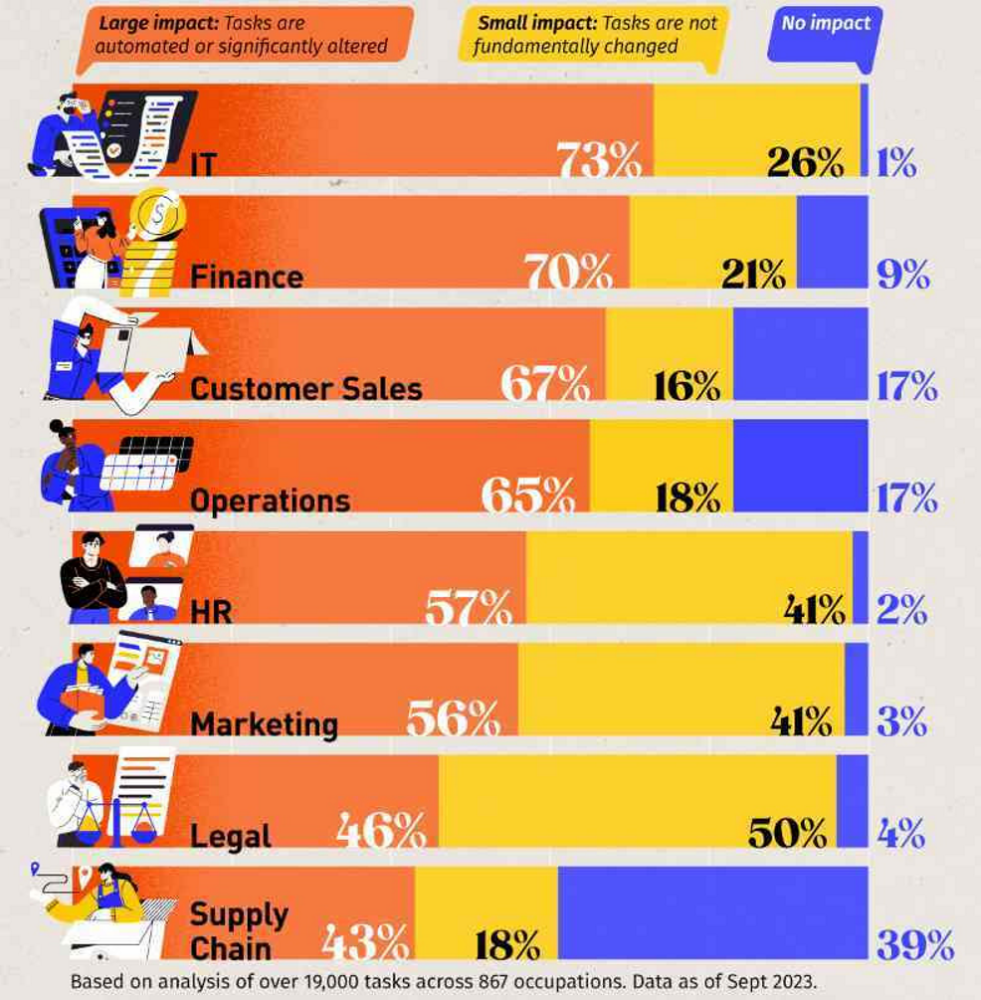
6. AI-Powered Document Analysis and Review
NLP AI has long facilitated parsing unstructured data in documents, enabling text analysis, sentiment analysis, and language translation. GenAI has further enhanced these capabilities, simplifying document review and analysis processes. For instance, AI can extract key information, identify terms, classify documents by type, and distinguish embedded derivatives within contracts across multiple languages, instantly translating as needed. It can even be trained to understand specific writing styles for more accurate analysis.
7. AI Fortifying Risk Detection and Cybersecurity
AI algorithms can analyze vast data volumes to identify patterns, anomalies, and potential fraudulent activities, providing valuable insights for risk detection and cybersecurity. This is particularly crucial for audit and finance functions, highlighting control failures or process deviations, as well as in banking for detecting financial crimes like fraud and money laundering. Businesses also leverage AI for identity verification, network security, and threat intelligence analysis, fortifying their cybersecurity posture.
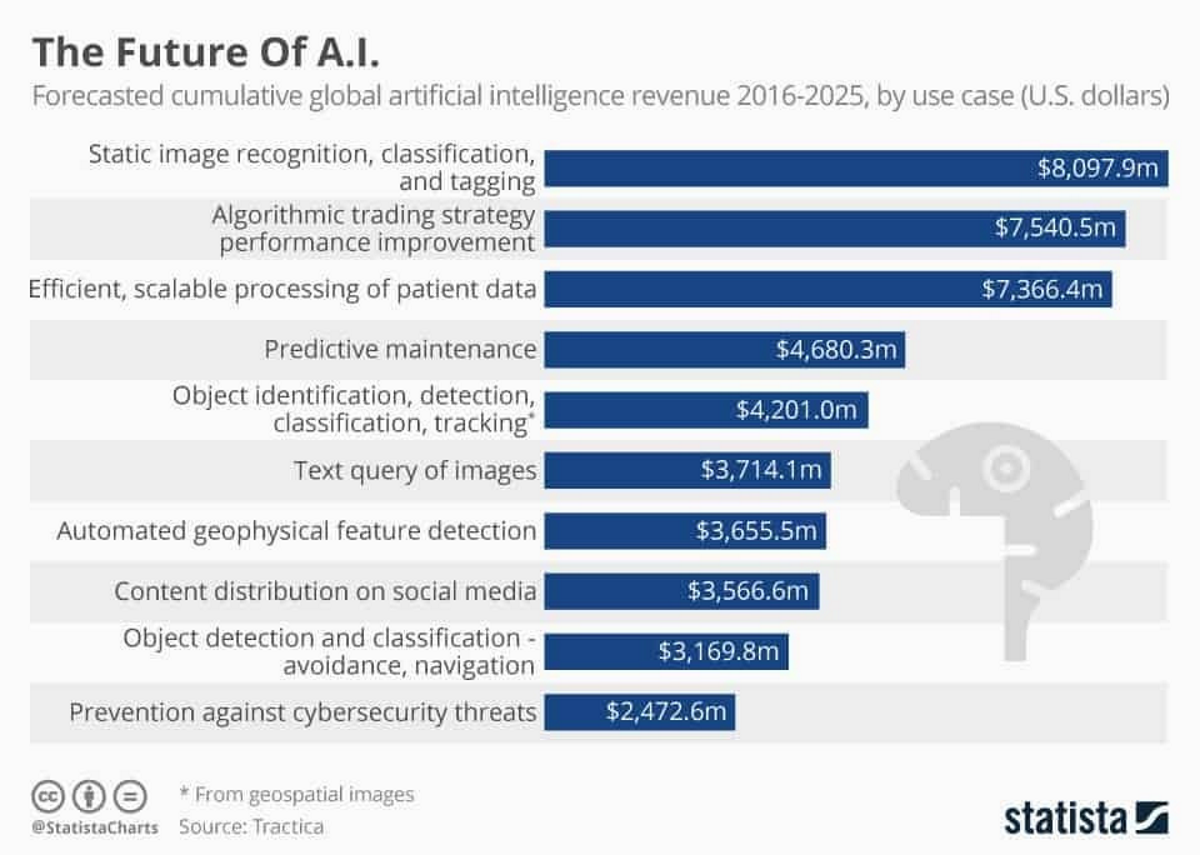
8. AI-Driven Predictive Analytics and Forecasting
AI-powered predictive analytics models analyze vast datasets to forecast future trends, outcomes, and behaviors, enabling businesses to make informed decisions. Applications include demand forecasting, sales projections, risk management, inventory optimization, and supply chain disruption anticipation.
Additionally, AI analyzes customer data from various sources to generate insights, segment customers, and personalize marketing campaigns, products, and services, improving engagement, loyalty, and satisfaction.
Generative AI also creates synthetic data for modeling, simulations, and decision-making, facilitating analysis of expected returns, costs, benchmarking, and other metrics.
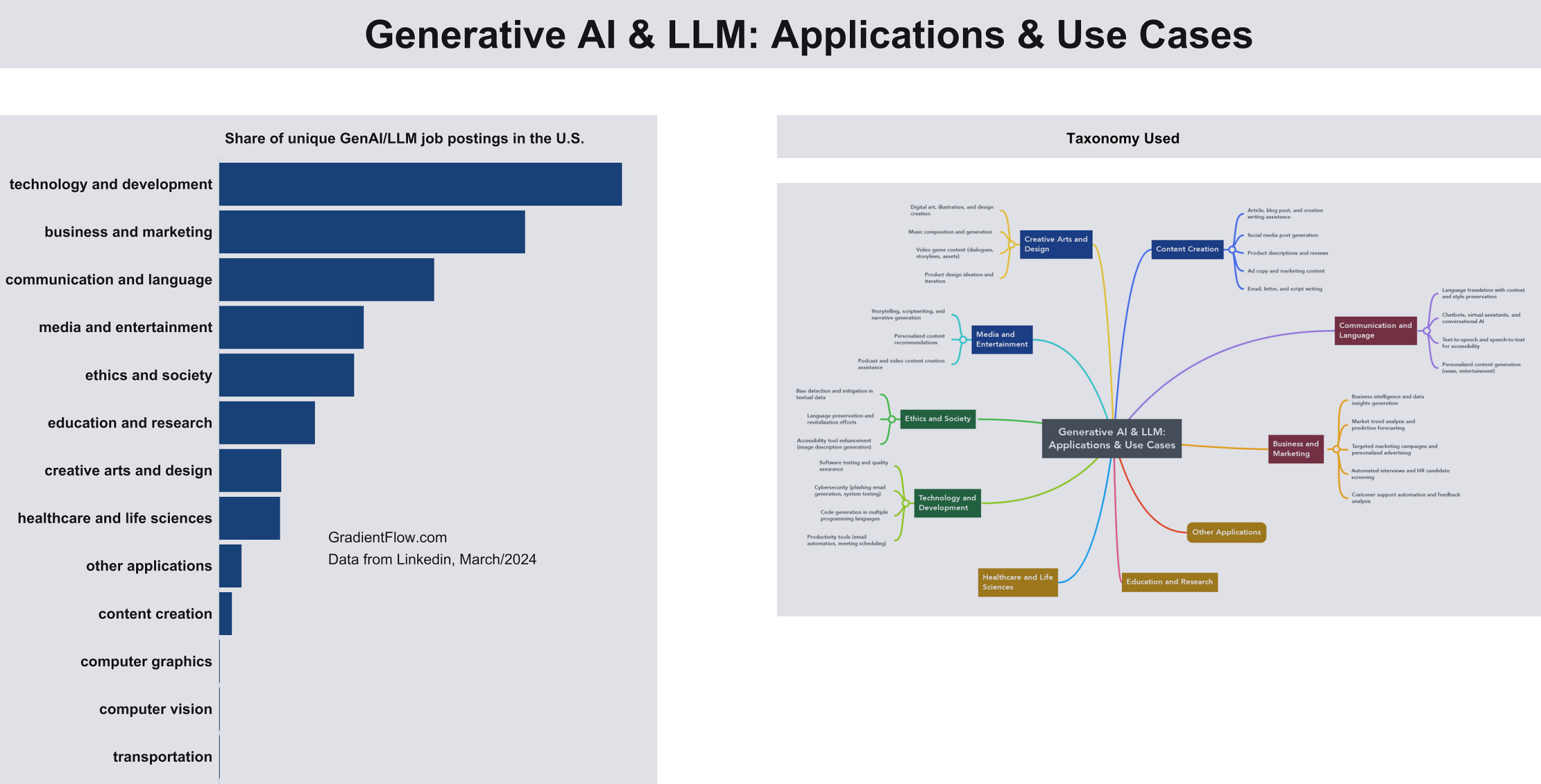
AI Driving Industry-Specific Innovations
While generative AI is transforming operations across sectors, it is also driving industry-specific innovations that are reshaping entire markets. In the pharmaceutical industry, AI has accelerated drug discovery by creating entirely new molecules with desired properties, significantly reducing development costs and identifying new applications for existing drugs.
The technology sector is also witnessing a wave of AI-powered innovations. Samsung's latest smartphone release is dubbed an "AI phone," boasting features including:
- Circle to Search: allows users to circle objects or locations on their phones for AI-powered identification and information retrieval
- Live Translate: facilitates live conversations in multiple languages.
- An AI-powered camera: delivers better image quality and up to 100x zoom.
- Generative Edit: lets you edit pictures and use AI to remove people and objects from photos.
- Transcript Assist: helps you transcribe, translate, and summarize voice memos
- Chat Assist helps you craft the right tone for messages.
AI is also proving invaluable in emergency response and disaster management. Alphabet is using AI to direct resources during floods, earthquakes, and other natural disasters, enabling the National Guard to rapidly identify and respond to infrastructure damage caused by wildfires. The C2Smarter research consortium is using AI to analyze street sensors, providing alternative routes for first responders to avoid congested roadways. Additionally, AI is being used to classify emergencies based on urgency levels, ensuring that high-priority incidents receive prompt attention.
The potential of GenAI extends beyond traditional industries, as demonstrated by the success of Jackson Fall's experiment. By leveraging ChatGPT, Fall turned a $100 investment into a profitable eco-friendly product website valued at over $25,000 within a week, showcasing the entrepreneurial possibilities unlocked by AI.
As AI continues to advance, its impact on industry-specific operations and innovations will only intensify, driving unprecedented efficiency, growth, and transformative solutions across sectors.
Recommendations for Adopting GenAI
As enterprises explore GenAI use cases, focusing on in-house development through APIs can leverage increased model accessibility and flexibility. Start small but think big, considering an AI journey in waves. Initially, leverage readily available and relatively inexpensive technologies. Over time, layer on additional functionalities to become a fully AI-powered organization.
Prioritize use cases by inventorying and qualifying opportunities, ensuring data readiness, and establishing robust governance and data strategies. Invest in staff training, especially for those who will rely heavily on AI solutions. Embrace ethical principles by ensuring fairness and transparency about solution limitations, starting with simpler, lower-risk use cases.
------------------------------------------------------------------------
Subscribe to the AI newsletter and join the conversation on LinkedIn.
Have you begun to use AI yet? Or are you struggling to achieve tangible value from your deployments of AI to date?
Explore our offerings and acquire an expert partner today.
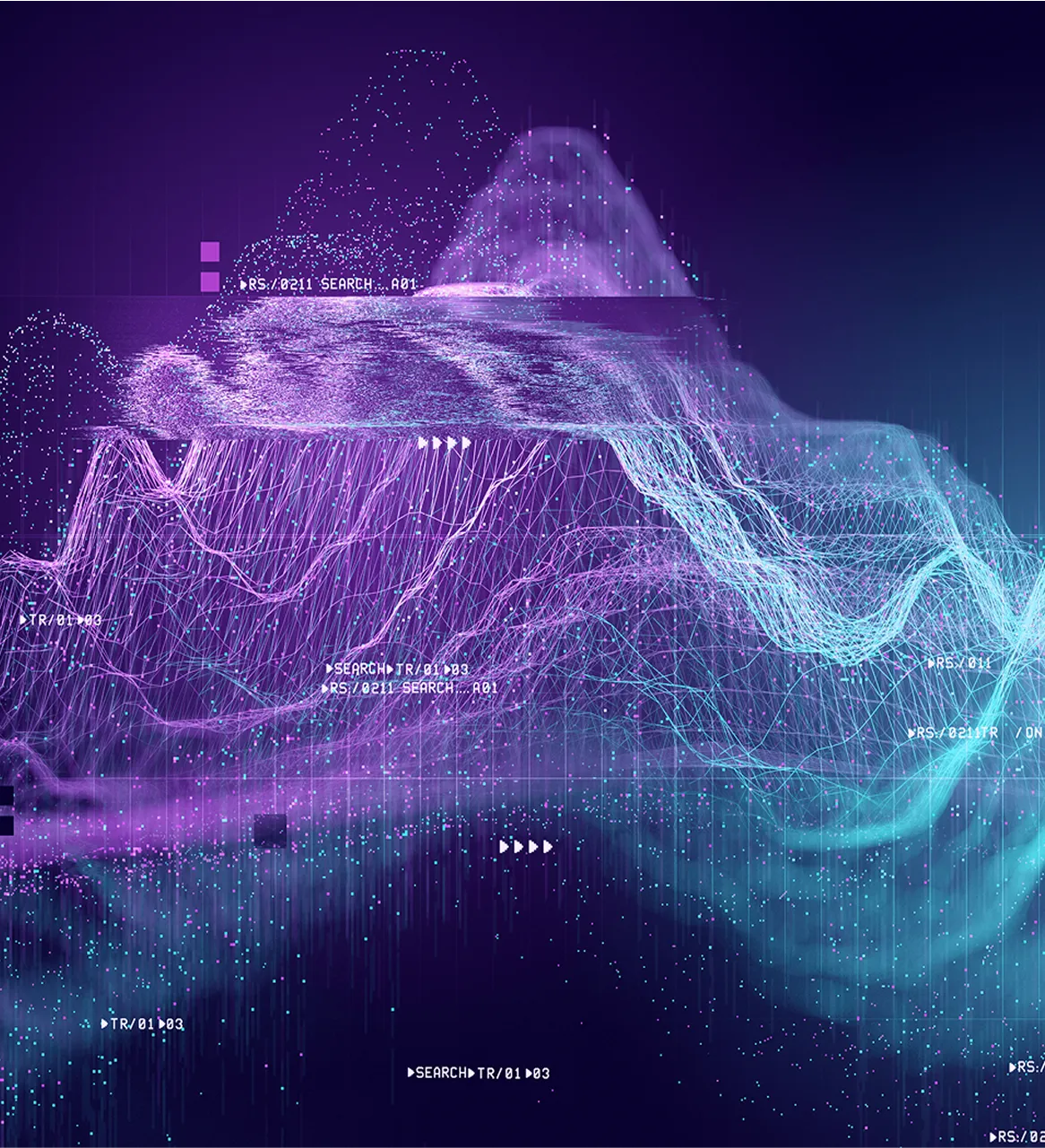
About The dAIta Solution
The dAIta Solution provides strategic consultancy, process and data mining, analytics, reporting and automation implementation solutions powered by AI that enable organizations to achieve their full potential hidden within the information that they possess. Our proprietary mining and analytics techniques and vendor-agnostic AI and data software streamlines the path to results and facilitates automation of both the analysis of your organization and implementing solutions to weaknesses or growth opportunities identified. Founded by senior consultancy services executives, data scientists and former EY leaders, The dAIta Solution is headquartered in Los Angeles with operations in London, Lagos and Singapore. For more information, please visit thedaitasolution.com.
Latest Resources
Want to see The dAIta Solution in action?
Get in touch now for a free demo of the platform, our products and services





